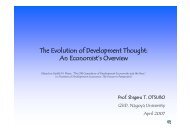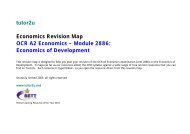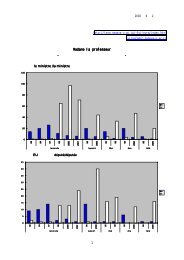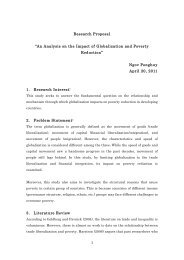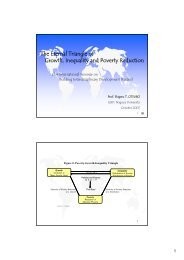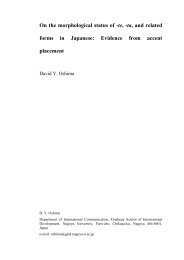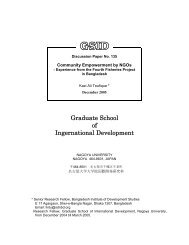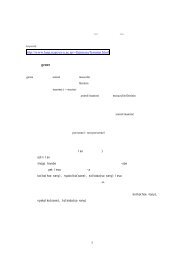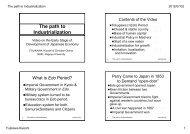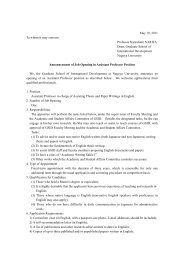Report
Report
Report
Create successful ePaper yourself
Turn your PDF publications into a flip-book with our unique Google optimized e-Paper software.
CONSTRUCTION AND RELATED ENGINEERING SERVICES 111<br />
important is to remove restrictions under Modes 3 and<br />
4. Under Mode 3 there are some companies from the<br />
region already involved in providing construction<br />
services in collaboration with local partners. Further<br />
liberalisation in commercial presence will increase the<br />
possibility of trade in construction services at regional<br />
level. Similarly, Mode 4 needs to be made quite open<br />
by allowing entry of even low and semi-skilled workers<br />
from the region. Pakistan being the second largest<br />
market in South Asia all other countries would look at<br />
it for seeking market access for their workers. Finally<br />
there is no reason why there should be any restrictions<br />
on Mode 1. This is the mode in which India, Sri Lanka,<br />
Bangladesh and Nepal would be interested in the<br />
Pakistani market. At the same time Pakistan would be<br />
equally interested in this mode. Therefore, it would be<br />
in Pakistan’s interest if it removed all restrictions from<br />
this mode.<br />
Sri Lanka<br />
Sri Lanka undertook very limited commitments and<br />
in a few services sectors during the Uruguay Round. In<br />
fact, its sector specific commitments cover only three<br />
sectors, namely, tourism and travel related services,<br />
financial services, and telecommunications services.<br />
However, its horizontal commitments under Mode 3<br />
indicate that foreign investors may invest in Sri Lanka<br />
in any sector other than the following: moneylending;<br />
pawn brokering; retail trade with a capital of less than<br />
$1 million; businesses providing personal services other<br />
than for export of tourism; and coastal fishing. This<br />
implies that foreign investors have not been prevented<br />
from investing in the Sri Lankan construction and<br />
related engineering services sector. This has further been<br />
clarified by the provision inscribed in horizontal<br />
commitments that foreign investment of up to 40% of<br />
equity in a company proposing to carry on a business<br />
activity listed below will be automatically approved by<br />
the BOISL and foreign investment in excess of 40%<br />
(and up to 100%) will be approved by the BOISL on a<br />
case-by-case basis in consultation with the relevant state<br />
agencies. The relevant sectors are the following: construction<br />
and residential buildings; mass transportation;<br />
telecommunications; mass communications; education;<br />
professional services; freight-forwarding; travel agencies;<br />
shipping agencies. This situation will be reviewed<br />
every two years with the aim of further simplification.<br />
Further, a provision has been made that if a foreign<br />
investor incorporates a company in Sri Lanka under<br />
the Companies Act and buys land in the name of the<br />
company, there will be no liability otherwise if a foreign<br />
individual buys land then s/he will be liable to pay a<br />
tax at 100% of the purchase price. There is one more<br />
provision in the horizontal section suggesting that in<br />
the relevant sectors when a joint venture partner is a<br />
public sector enterprise, while granting access,<br />
preference will be given to foreign service suppliers/<br />
entities, which offer the best terms for transfer of<br />
technology.<br />
As regards Mode 4, the horizontal section stipulates<br />
that movement of natural persons is subject to Sri<br />
Lankan laws on immigration, consumer laws, and other<br />
relevant laws and regulations. Thus foreigners, who<br />
intend to work or to conduct business in Sri Lanka,<br />
shall have to obtain the relevant work permits in addition<br />
to complying with the immigration requirements.<br />
In light of the above provisions, it is clear that<br />
foreign investors can invest in the construction and<br />
related engineering services sector subject to the<br />
limitations inscribed in the schedule. However, this<br />
poses several problems. Lack of sectoral commitments<br />
in the sector implies that Sri Lanka has not given the<br />
due importance the sector deserves The construction<br />
sector in Sri Lanka accounts for 7% of GDP and posted<br />
strong growth rates in 2005–06, largely due to tsunami<br />
reconstruction projects (US Department of State 2007).<br />
Also, it can only be assumed that there are no<br />
commitments in Modes 1 and 2. Particularly, Mode 1<br />
is a fairly significant mode for delivery of various<br />
services in the construction sector. Similarly, there are<br />
no sector specific commitments under Mode 4 and<br />
those, which are inscribed in the horizontal section, do<br />
not make things easier as all immigration rules and<br />
regulations apply. Same view can be expressed regarding<br />
the commitments on professional services. Thus one<br />
can only assume that all professional services can be<br />
supplied but only through Mode 3. Overall, what<br />
appears from the Sri Lankan schedule is that the<br />
commitments in the sector are not only restrictive but<br />
also ambiguous.<br />
Although Sri Lanka has submitted its initial offer<br />
as part of the requirement of the ongoing round of<br />
services negotiations, its offer has not been made public.<br />
However, as already noted in the previous chapter, Sri<br />
Lanka has not included the construction services sector<br />
in its initial offer. In consequence, the sector remains<br />
one of the most restrictive under the GATS regime. Sri<br />
Lanka being an important market in the region, non-<br />
Sri Lankan South Asian service providers may be<br />
affected by not having a liberal regime in that country.




